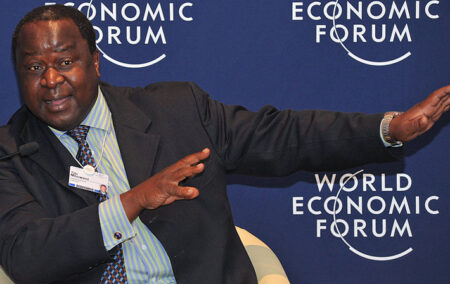None of finance minister Tito Mboweni’s most important proposals has been supported by the national executive committee (NEC) of the African National Congress (ANC).
Some commentators have claimed that the NEC emerged from its meeting last week with an effective endorsement of Mboweni’s economic recovery plan.
But none of the finance minister’s most important proposals was in fact supported. Eskom’s faltering coal stations are not to be sold off, but kept in state ownership. Bankrupt state-owned enterprises (SOEs) will not be privatised, but merely allowed to sell off minority equity stakes – which few businesses will want. Moreover, if any change in SOE ownership is to occur, this must give primacy to the ‘worker’ and ‘social’ (ie, co-operative) ownership the SACP has long desired to help secure a ‘socialised’ economy.
The Tito document’s idea of allowing the private sector to help run trains and ports has also been jettisoned. And this despite the fact that Transnet’s rail network is ‘too old and slow’ – to quote China’s ambassador to South Africa, Lin Songtian – and the country’s ports are far too ‘inefficient’.
Vital proposed reforms to labour laws for the benefit of small business – the extension of bargaining council agreements and the national minimum wage – have been referred to Nedlac and so effectively abandoned too. Yet the ANC is well aware that these rules drive up entry wages to the point where the youth, in particular, are priced out of the labour market.
By contrast, the key change that Mr Mboweni did not want – a shift in macroeconomic policy – has been strongly recommended. In his strategy document, the finance minister underscored the importance of ‘a stable macroeconomic policy framework underpinned by a flexible exchange rate, inflation targeting, and credible and sustainable fiscal policy’.
This was a clear endorsement of the Reserve Bank’s current constitutional mandate – to put its ‘primary’ focus on ‘protecting the value of the currency’. It also explicitly supported the Bank’s inflation-targeting strategy, so helping to shield the Bank from growing ANC/SACP pressure to lower interest rates and print money in order to engineer an (unsustainable) spurt in growth and employment.
Far from backing his finance minister on this key issue, President Cyril Ramaphosa criticised the Tito document for lacking an essential ingredient – a focus on ‘the country’s macroeconomic strategy’ – and for dealing only with ‘micro-economic interventions’.
By contrast, the NEC statement is strong in its demand for a shift in macroeconomic policies. Such policies, it repeats at various points, must ‘contribute to higher growth and employment’, must encourage ‘growth and job creation’, and must promote ‘economic objectives’.
Political pressure on the Reserve Bank to lower interest rates is thus likely to accelerate. But lowering interest rates can do little to stimulate growth and jobs when the country’s maximum ‘potential growth rate’ is down to a meagre 1% of GDP.
Writes contributing Business Day editor Hilary Joffe: ‘Electricity shortages and weak investment have eroded the economy’s capacity to grow, and it’s now far below the population growth rate of 1.6%’. In this situation, lower interest rates are unlikely to raise the growth rate above a paltry 1.5%.
In addition, the Reserve Bank can influence only short-term interest rates, whereas business bases its investment decisions on longer-term rates – typically, the cost of borrowing over five to seven years. Adds Ms Joffe: ‘The cost of long-term money, measured by 10-year bond yields, at 9.1%, is far above the cost of short-term money’. Moreover, increased political pressure on the Bank is likely to push these long-term costs still higher.
Mr Mboweni’s call for ‘credible and sustainable fiscal policy’ has also been jettisoned – if only through the NEC’s determination to push ahead with the National Health Insurance (NHI) proposal.
Health minister Dr Zweli Mkhize has recently suggested that annual tax revenues will have to increase by at least R250bn (the amount of private healthcare spending in the current financial year) when the NHI begins. This sum is more than the entire corporate income tax take (R220bn) in 2017/18, suggesting that substantial tax increases will in time be introduced.
The ANC NEC is nevertheless determined to press on with the fiscally irresponsible NHI. It is also seeking to drown out reasoned objections to the NHI by launching a ‘Million Signature’ Campaign, to be implemented with the help of the SACP and Cosatu.
This campaign is sure to put a massive emphasis on the false NHI promise of free quality healthcare for all 59 million South Africans. It will brush aside, of course, the huge risks in increasing already high public debt, pushing the country deeper into junk status, and triggering a major exodus by health professionals and the skilled and tax-paying middle class.
Various commentators have pointed to the superficial similarity between the Tito document and the NEC statement. The NEC statement takes care to echo the five key themes in Mr Mboweni’s document, promising to modernise network industries, increase competition, prioritise growth in labour-intensive sectors, refocus industrial and trade policy, and promote exports into the African region.
However, none of these steps will have much impact unless, at minimum, the SOE burden on the economy is lifted, labour laws are liberalised, sensible macroeconomic policies are maintained, and the unaffordable NHI is abandoned.
But the ANC’s NEC has rejected all these aspects of the Tito document. It has gutted the proposed strategy of its essential content in favour of glib assurances about ‘growth-enhancing reforms’ that cannot possibly succeed without the tougher interventions the finance minister rightly recommended.
Dr Anthea Jeffery is Head of Policy Research at the IRR
If you like what you have just read, become a Friend of the IRR if you aren’t already one by SMSing your name to 32823 or clicking here. Each SMS costs R1.’ Terms & Conditions Apply.

